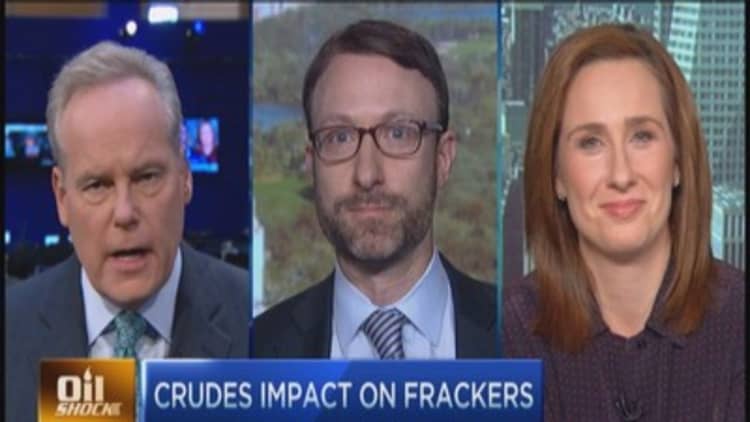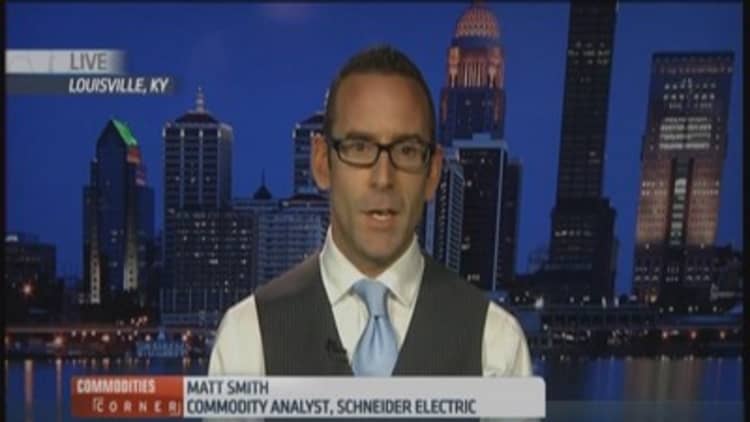The amount of oil that the United States could potentially recover thanks to the shale boom is equal to about three times Iran's proven reserves, but exploration and production companies could soon have a harder time extracting black gold from the country's basins.
As U.S. oil prices have tumbled from their June highs, so too have the shares of many small and mid-sized players in the U.S. shale industry. Investors worry that if oil prices remain below $80—West Texas Intermediate was near $79 on Friday—some firms could see their debt loads rise and find it difficult to fund exploration and sustain production growth, analysts said.
Employment in the oil and gas sector has grown more than 72 percent to 212,200 in the last decade as technology such as horizontal drilling and hydraulic fracturing have made it possible to reach fossil fuels that were previously too expensive to extract.
Read More Drilling chief calls bottom on U.S. oil
In order to fund the rapid growth, exploration and production companies have borrowed heavily. The energy sector accounts for 17.4 percent of the high-yield bond market, up from 12 percent in 2002, according to Citi Research.
"A lot of these smaller companies, in particular the smaller frackers, they rely on debt, and the debt markets have been wide and open for them," Gregory Zuckerman, author of "The Frackers," told CNBC's "Power Lunch." "It not clear it's going to be (that way) going forward."
The question is whether companies can keep their balance sheets healthy and continue to grow in the face of falling prices. U.S. oil futures have fallen about 24 percent from a high of $103.66 in June.

Lower production growth
Exploration and production companies are unlikely to accelerate operations in a cheap oil market because they are worried about increasing their debt load, said Michael Rowe, a researcher at energy investment and merchant bank Tudor Pickering Holt.
Lower production growth will likely hurt stock prices in the short term, he said, but firms that significantly outspend their cash flows to fund expansion could have a harder time accessing credit in the future.
Read More OPEC cuts oil price forecasts as 'price war' bites
"They can either drill themselves into a much worse credit profile or make the right decision for the financial health of the company and take their foot off the accelerator, so to speak," Rowe said.
Investors become concerned when a company's debt reaches twice earnings on an EBITDA basis, and further scrutinize balance sheets when leverage reaches three times earnings, according to Tudor Pickering Holt.
The debt load of about half of the mid- and small-cap companies Tudor Pickering Holt covers would exceed two times EBITDA or accelerate above three times earnings if U.S. crude prices consolidate at $80 next year, according to the firm's models.
The Dallas-based Westwood Small Cap Value fund recently sold its position in Rex Energy after the firm's debt load reached three times EBITDA following its purchase of acreage in Pennsylvania and Ohio from an affiliate of Royal Dutch Shell.
Rex did not immediately return a call seeking comment.
Read More Bears surround oil as it falls below $80 a barrel
"It's a good acquisition. Unfortunately it stretches their balance sheet," said Bill Costello, senior analyst and portfolio manager at Westwood. "In this price environment, they're in a tough spot."
Westwood is holding its positions in firms with one-to-one debt-to-earnings ratios, including Bonanza Creek, Synergy Resources and RSP Permian.

Mid-cap producer Whiting Petroleum is targeting production growth in the high teens to 20 percent next year, in line with projections for 2014. Chairman and CEO James Volker said on the company's third-quarter conference call that production would remain about the same at $75 per barrel and perhaps even at $70.
Read More Crude oil hasn't bottomed yet, traders say
The company's shares have fallen more than 30 percent in the last three months amid a broad selloff in exploration and production stocks.
Eric Hagen, vice president of investor relations at Whiting, told CNBC the company's balance sheet is strong—its debt is about 1.6 times earnings—and noted that the average price target on its stock is $93, about $30 below where it currently trades. He added that cheap oil presents an opportunity for healthy companies to streamline and become more cost-efficient ahead of the next upward cycle.
"Companies who have higher leverage and are in places that aren't as efficient yet, those people aren't going to be able to sustain the pace," Hagen said.
Productivity is key
At $80 per barrel the companies can still generate a fairly attractive rate of return, said Rowe, but if prices near $70 per barrel, some shale firms may begin backing away from marginal shale plays. In the $60 range, they could decelerate production.
A firm's ability to keep up production growth in a low-price environment depends largely on how productive its wells are and whether its portfolio of shale plays is diversified, analysts said.
Read More UN: Cut carbon emissions by 2100 to save the world from climate change
"Although many companies can still operate at significantly lower commodity prices, there is a wide divergence in asset quality and management competence," Citi Research analysts wrote in a recent research note.
The break-even costs of operating in different parts of the country vary widely. They range from $30 to $40 per barrel in parts of South Texas's Eagle Ford, to $70 to $90 in Louisiana's Tuscaloosa Marine Shale. Even within regions, the economics differ significantly from well to well.
Read More Syrian Regime, Iraqi Kurds Among Those Buying ISIS Oil: Official
Another issue is that many small and mid-sized firms have not significantly hedged against price drops, analysts said. Hedging is when firms buy futures contracts that could offset losses in case volatility.
Out of 57 exploration and production companies with high-yield debt, Citi Research found that firms are moderately hedged for 2015, with the median company having 40 percent of its oil hedged.
In the face of a prolonged slump in oil prices, unhedged companies with less diversified assets may be forced to scale back expansion plans, leave marginal acreage unproductive or even sell some assets. However, damage will likely be limited to profits and shouldn't impact employment.
"If companies are lean machines and efficient, I don't think $75 a barrel is going to cause anyone to get fired," Rowe said.



